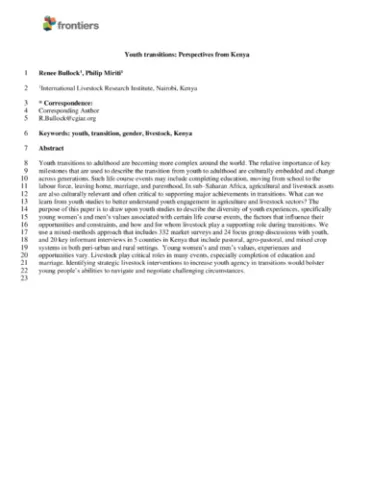Youth transitions: Perspectives from Kenya

Abstract
Youth transitions to adulthood are becoming more complex around the world. The relative importance of key milestones that are used to describe the transition from youth to adulthood are culturally embedded and change across generations. Such life course events may include completing education, moving from school to the labour force, leaving home, marriage, and parenthood. In sub–Saharan Africa, agricultural and livestock assets are also culturally relevant and often critical to supporting major achievements in transitions. What can we learn from youth studies to better understand youth engagement in agriculture and livestock sectors? The purpose of this paper is to draw upon youth studies to describe the diversity of youth experiences, specifically young women’s and men’s values associated with certain life course events, the factors that influence their opportunities and constraints, and how and for whom livestock play a supporting role during transitions. We use a mixed-methods approach that includes 332 market surveys and 24 focus group discussions with youth, and 20 key informant interviews in 5 counties in Kenya that include pastoral, agro-pastoral, and mixed crop systems in both peri-urban and rural settings. Young women’s and men’s values, experiences and opportunities vary. Livestock play critical roles in many events, especially completion of education and marriage. Identifying strategic livestock interventions to increase youth agency in transitions would bolster young people’s abilities to navigate and negotiate challenging circumstances.
